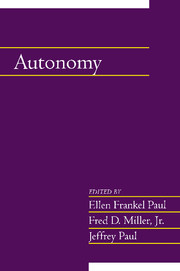Book contents
- Frontmatter
- Contents
- Introduction
- Acknowledgments
- Contributors
- Stoic Autonomy
- Autonomous Autonomy: Spinoza on Autonomy, Perfectionism, and Politics
- Kant on the Theory and Practice of Autonomy
- How Much Should We Value Autonomy?
- Autonomy, Duress, and Coercion
- Autonomy and Hierarchy
- Reason and Autonomy
- Identification, the Self, and Autonomy
- Some Tensions between Autonomy and Self-Governance
- Autonomy from the Viewpoint of Teleological Behaviorism
- The Paradox of Group Autonomy
- Abortion, Autonomy, and Control over One's Body
- Freedom as a Political Ideal
- Index
Reason and Autonomy
Published online by Cambridge University Press: 06 July 2010
- Frontmatter
- Contents
- Introduction
- Acknowledgments
- Contributors
- Stoic Autonomy
- Autonomous Autonomy: Spinoza on Autonomy, Perfectionism, and Politics
- Kant on the Theory and Practice of Autonomy
- How Much Should We Value Autonomy?
- Autonomy, Duress, and Coercion
- Autonomy and Hierarchy
- Reason and Autonomy
- Identification, the Self, and Autonomy
- Some Tensions between Autonomy and Self-Governance
- Autonomy from the Viewpoint of Teleological Behaviorism
- The Paradox of Group Autonomy
- Abortion, Autonomy, and Control over One's Body
- Freedom as a Political Ideal
- Index
Summary
INTRODUCTION
Reason has co-opted our conception of autonomy. My purpose is to set autonomy free. Here is the problem: some philosophers, Kant most notably, have said that governing your life by reason or by being responsive to reason is the source of autonomy. But there is a paradox concealed in these plausible claims. On the one hand, a person can be enslaved to reason and lack autonomy because of this kind of bondage. On the other hand, if reason has no influence, then it appears that one would be the slave of one's passions, and, however eloquently Hume might have written about reason being the slave of the passions, there is something odd about the idea that a person who is enslaved by his passions is autonomous. The paradox, which I shall call the paradox of reason, is that if we are governed by reason in what we choose, then we are in bondage to reason in what we choose, and we are not autonomous. Yet, if we are not governed by reason, then we do not govern ourselves in what we choose, and again we are not autonomous.
I do not think that this paradox is a mere sophism of philosophy. At the level of phenomenology, we might feel that if we are governed by reason, then we are constrained by it, and if we are not governed by reason, then we are not in control.
- Type
- Chapter
- Information
- Autonomy , pp. 177 - 198Publisher: Cambridge University PressPrint publication year: 2003
- 1
- Cited by



